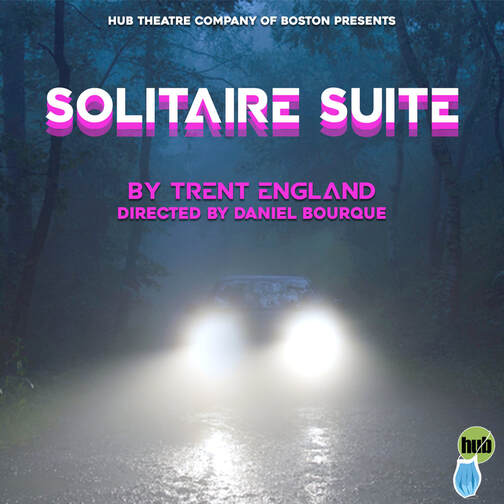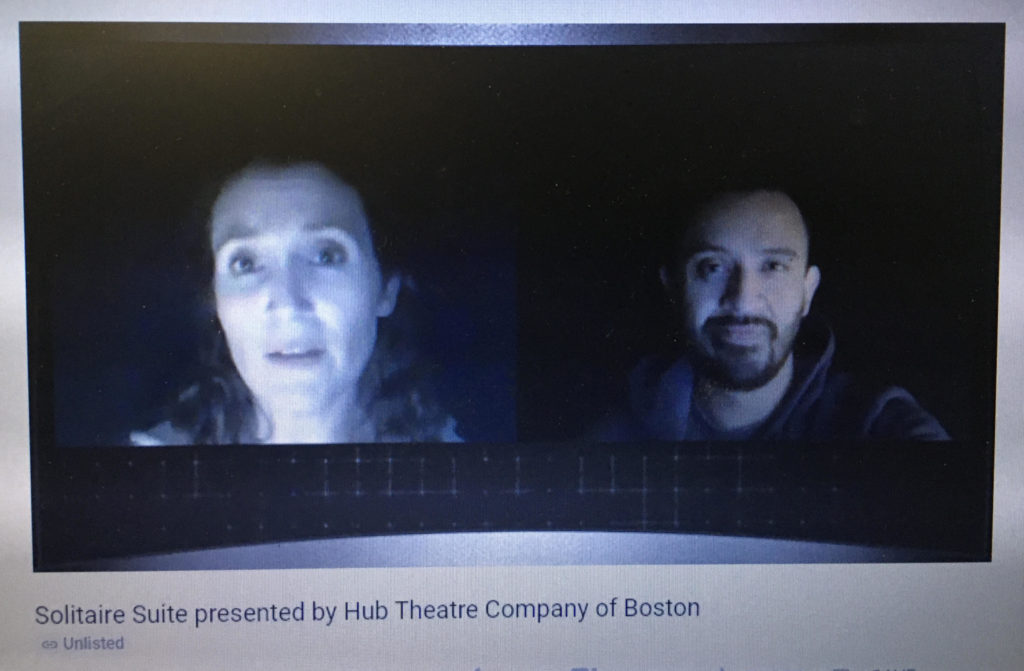 Presented by Hub Theatre Company of Boston
Presented by Hub Theatre Company of Boston
Written by Trent England
Directed by Daniel Bourque
Stage management by Madeline Hartrich
and Kelsey Whipple
Sound Design by Kyle Lampe
Digital Design by Justin Lahue
Feb 20 – Feb 27 2021
Youtube Presentation
Boston, MA 02116
Hub on Facebook
Critique by Kitty Drexel
YOUTUBE — Anxiety is a feminist issue. Women are told they are too emotional, too sensitive, and too fragile. Our responses to stimuli are so criticized that we disbelieve our own experiences. We distrust our own instincts – no matter how perceptive.
Believing women is the basis for the #MeToo movement. Trust women, we say. The message should carry a caveat to emphasize that society must grant women the benefit of the doubt in all situations. Believe us when we’ve been assaulted and at other times, too. Believe us all the time.
Hub Theatre premiered Solitaire Suite by Trent England on February 20. Marty Mason is Celeste, a conscientious mother on a car ride with her husband Pete (Cristhian Mancinas) and their son, Tiger (Michael Lin). Celeste tells the viewer about how her family came across an unidentified flying object on their way home from retrieving Tiger from a failed sleepover. The family follows the UFO and has an unexpected engagement with the unknown.
Solitaire Suite is science fiction. The character Celeste delivers the events of the play in one stream-of-consciousness monologue with occasional interjections from Pete and even fewer from Tiger. We learn her hopes, dreams, frustrations, exultations, and fears in quick order and without censure. It’s a lot for a bystander to receive without judgement. But Celeste’s isn’t a disordered mind; It is a typical mind with typical shifting thoughts. Let the first person to have an uncluttered mind cast the first stone (and receive a lifetime membership to the yoga studio of their choice).
Celeste is a caring mother, a devoted wife, an exhausted woman who just wants to go home, put on her PJs and drink a glass of wine behind her iPad. Mason plays Celeste with genuine compassion and relatable acquiescence. Mason is an earnest mother responding to her son’s embarrassment and a jubilant partner when Pete is tender with his son. Mason has us believing not just in UFOs but in their potential for family fun time.

Marty Mason and Cristhian Mancinas García
Through her thoughtful performance, Mason makes Celeste an “everywoman,” not just a frustrated housewife. I have neither a husband nor a child, and I identified strongly with Mason’s personification of woman with both.
Mason does all of the heavy lifting in Solitaire Suite. Garcia and Lin are fine in their roles, but they aren’t especially memorable. The role of Pete is supportive in every aspect: Pete says his lines when he’s cued by Celeste; Garcia shows up on camera when Pete has an action to perform. It’s Celeste’s show and Pete, like a good costar, doesn’t steal focus. Tiger’s face is never seen. That Garcia cedes the spotlight to Mason tells us that Garcia is a good co-actor and that the video editor knew what they were doing.
The inter-scene tech feedback sounds and images by Kyle Lampe and Justin Lahue plant this production firmly in the science fiction genre. England’s script could possibly be ambiguously interpreted as a fictional drama about the dangers of technology without the work of Lampe and Lahue. Their distorted FM radio signals and pirouetting mobile phones leave no room for doubt.
It should take a work of science fiction to convince the human population to believe women, but it doesn’t hurt. There’s more than a kernel of truth in Solitaire Suite. It helps no one if we make women emotional gatekeepers and unreliable narrators of their own experience. If we can’t believe women when they react reasonably to uncertainty, then maybe its not women we should be doubting. Maybe its the people doubting them. (It is.)
